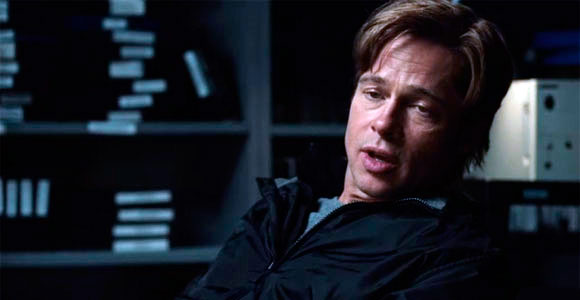“A Contemporary Ode to Underdogs: A Review of “Moneyball” (2011)” is a compelling, modern tribute to those who dare to navigate uncharted territories. It is an inspirational testament that knowledge, determination, courage, and innovative thinking can turn the tide against seemingly insurmountable odds. Moneyball, based on a true story, is a mesmerizing saga that challenges conventional wisdom and shatters preconceived notions about America’s beloved pastime – baseball.
Directed by Bennett Miller and scripted by Steven Zaillian and Aaron Sorkin, the movie seeks to unravel the inner workings of baseball management, bringing a fresh, insightful perspective to the world of sports films. The makeup of the film’s principal characters are of great import and played splendidly by the cast members. Brad Pitt as Billy Beane, Jonah Hill as Peter Brand, and Philip Seymour Hoffman as Art Howe play significant and pivotal roles.
Brad Pitt’s performance as Billy Beane, the Oakland A’s general manager, is simply stellar. His charisma, spontaneity, and emotional depth create a flesh-and-blood character that is not just a figurehead of baseball statistics, but a man with a personal history, burdened past and a determination to create a revolution. Pitt’s Oscar-nominated portrayal of a man who dares to break the norms to level the playing field is utterly memorable.
Jonah Hill, as the yale-educated economist Peter Brand, brings in a delightful balance to Pitt’s expressiveness. Hill’s portrayal of an introverted, number-crunching genius who introduces Beane to sabermetrics, the empirical analysis of baseball, is brilliant. Philip Seymour Hoffman, as the team manager, represents the old school mentality reluctant to embrace new methods. His stoic performance is worthy of high praise.
In true Aaron Sorkin fashion, “Moneyball” is filled with quick-witted dialogue and long, thoughtful monologues on the nature of the sport, life, and persistence. The film successfully underscores the often-forgotten human aspect of baseball – the players, the management, the fans, and the palpable tension inherent in every match. It fascinated the audience not with flashy sports sequences, but with the behind-the-scenes battles fought in conference rooms and negotiation tables.
Wally Pfister’s cinematography captures every scene with stunning realism, from the intense, crowded stadium to the quiet solitude of the manager’s office. The film’s score by Mychael Danna subtly amplifies the narrative and echoes the film’s mix of melancholy, hope, and suspense.
Yet, “Moneyball” is not just a sports film. It’s a study in underdogs fighting against a system that’s rigged against them. It’s about using intellect and innovation to overcome financial disadvantages. It’s a tribute to those who trust the numbers over subjective judgments and have the courage to implement change.
Miller makes a daring move by deviating from the traditional, triumphant sports movie trope of a ragtag team winning the championship against all odds. Instead, he shows us the emotional highs and lows of managing a team and dealing with a system that favors the rich. The thrill in “Moneyball” lies not in the final outcome but in the journey and the struggles along the way.
However, the film isn’t without its drawbacks. At times, it tends to overemphasize the sabermetric approach, making it seem like a magic bullet solution. Also, non-baseball fans might find the jargon and numeric trivia a bit hard to follow.
Overall, “Moneyball” (2011)” is a uniquely intellectual sports drama – a compelling narrative driven by authentic, human emotions, a revolutionary vision, and a sheer love for the game. It beautifully weaves the statistical underpinnings of baseball with the undying spirit of an underdog, redefining the sense of victory and success. With brilliant performances and well-executed storytelling, this cinematic gem is a winner in its own right.




